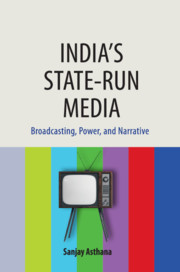Book contents
- Frontmatter
- Dedication
- Contents
- List of Figures and Tables
- Acknowledgements
- Introduction
- 1 Broadcasting, Spatiotemporalities, and Power
- 2 Doordarshan, Literary Drama, and Narrative Identity
- 3 Televisual Representations of Socio-Spatial Conflicts, and the Religious–Secular Imaginaries
- 4 Patriotism and Its Avatars: Tracking the National–Global Dialectic in Music Videos and Television Commercials
- 5 Remembering Doordarshan: Figurations of Memories and Nostalgia on Blogs, YouTube, and in Oral Interviews
- Epilogue
- Bibliography
- Index
3 - Televisual Representations of Socio-Spatial Conflicts, and the Religious–Secular Imaginaries
Published online by Cambridge University Press: 08 May 2019
- Frontmatter
- Dedication
- Contents
- List of Figures and Tables
- Acknowledgements
- Introduction
- 1 Broadcasting, Spatiotemporalities, and Power
- 2 Doordarshan, Literary Drama, and Narrative Identity
- 3 Televisual Representations of Socio-Spatial Conflicts, and the Religious–Secular Imaginaries
- 4 Patriotism and Its Avatars: Tracking the National–Global Dialectic in Music Videos and Television Commercials
- 5 Remembering Doordarshan: Figurations of Memories and Nostalgia on Blogs, YouTube, and in Oral Interviews
- Epilogue
- Bibliography
- Index
Summary
Secularism, perhaps more than any other category or concept, has increasingly become entangled with religious practices in several postcolonial societies (Majid, 2000). Although most political and religious conflicts in this part of the world have their beginnings in this entanglement, various responses to these conflicts have generally taken two approaches: they either assume the resurgence of religious identities as a result of an encroaching secularism, or consider secularism and religion as two opposing and incompatible value systems. However, events of the last few years, especially 9/11, the subsequent ‘global war on terror’, and the rising violence from Darfur to Somalia underscore the importance of engaging religion. It should be noted that in certain manifestations religion and secularism can become tyrannical, and one needs to be vigilant against the violent epistemologies of both.
The postcolonial scholar Dipesh Chakrabarty, reacting to the secular intellectual incredulity towards religious beliefs and practices, urges that we pay close attention to ‘the importance of faith in guiding contemporary imaginations of the political’ (Chakrabarty, 2004: 462). To engage religion in terms of a critical inquiry or ‘political theology’ is to explore the practices of ethics and tolerance among various religions, and to identify points of conversation with secularism. In a similar gesture, William Connolly (2006) argued that religious practices and secular principles ought to be brought into a productive dialogue. Furthermore, Chakrabarty and Connolly point out that pursuing religion and secularism as binaries may be theoretically untenable and practically unsustainable given the fact that in most postcolonial and non-Western contexts—and, perhaps, even in the Western world—religion and secularism frequently overlap.
Similarly, Jose Casanova (1994), in his comparative historical work on religious movements, pointed out that along with the rise of religious fundamentalisms of various hues, there have been important conversations across the boundaries of the religious and the secular:
The religious revival signaled simultaneously the rise of fundamentalism and its role in the resistance of the oppressed and the rise of the ‘powerless’. Ali Shariarti, the intellectual father of the Islamic revolution, in translating Frantz Fanon's Les Damnes de la Terre, chose the resonant Koranic term mostaz'afin (the disinherited) … Gustavo Gutierrez, the father of liberation theology, effected a similar transvaluation from the secular back to the religious categories when he turned the proletariat into the biblical los pobres. (Quoted in Jakobsen and Pellegrini, 2000: 13)
- Type
- Chapter
- Information
- India's State-run MediaBroadcasting, Power, and Narrative, pp. 83 - 106Publisher: Cambridge University PressPrint publication year: 2019



